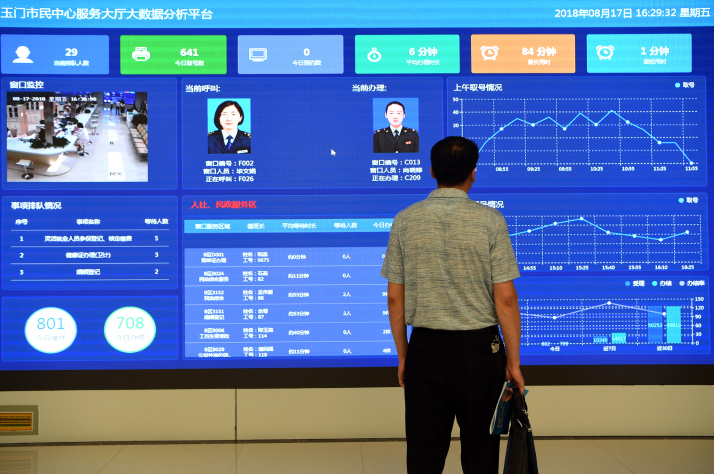In the Internet Era, China Is Enhancing its People-oriented Principle

The Internet has increased people’s ability to make their voices heard in China
The Internet has changed the traditional pattern of politics. In China, it has increased people’s ability to make their voices heard.
Chinese netizens have been vocal on the Internet since their emergence. In 2010, opinion leaders, mainly intellectuals and members of the media, launched the Onlookers Changing China campaign, paying attention to public affairs so that their collective gaze acted as a pressure tactic on those being watched.
In 2011, when a bullet train accident in Wenzhou, Zhejiang Province in east China, killed 40 and injured more than 170, many netizens questioned the reliability of high-speed railway technologies. The government responded by improving the high-speed rail system. Subsequently, experts and opinion leaders explained to the public the necessity of developing high-speed rail, and the public’s attitude gradually changed. Today, China has built the world’s best and largest high-speed rail network.
The Internet has become a powerful tool for people to express themselves. The Communist Party of China (CPC) is also keen to learn about public opinions and does so through online platforms.
Channel of communication
The CPC says its purpose is to “serve the people,” to constantly meet their wishes and needs, and transform people’s will into governance strategies and the will of the nation.
Apart from strengthening Party building and intra-Party democracy, the CPC tries to identify and resolve its own problems with the help of the Internet, while ensuring that China’s cyberspace is immune to foreign interference.
The Fourth Plenary Session of the 19th CPC Central Committee last October stressed to “innovate the mechanism of mass work in the Internet era, always serve the people, trust the people, rely on the people, lead the people, and go deep into the grassroots level… and closely unite the people around the CPC.”
The government is serious about dealing with Internet opinions. When online posts have accused officials of corruption or other crimes, the government has responded to them very quickly and punished the wrongdoings, if the accusations were true.
On February 27, at the peak of the novel coronavirus disease (COVID-19) epidemic in China, the Ministry of Justice published the draft regulations on the administration of permanent residence of foreigners to solicit public opinion. The draft, seemingly a bit unpolished, drew widespread criticism, particularly from online communities. The ministry responded quickly, promising to carefully study the feedback and revise the draft.
In the initial stage of the outbreak, there were complaints on the Internet about excessive bureaucracy. Once again, the government took immediate action. When President Xi Jinping visited Wuhan, the city in China that suffered most from COVID-19, in March, he once again urged officials to overcome bureaucracy and formalism. By mobilizing the whole country, maximizing coordinated efforts, and making huge sacrifices in the economic sector, China finally contained the epidemic and life started to get back to normal, slowly but surely.
Nonetheless, the Internet is a double-edged sword. Zhang Weiwei, a professor at Shanghai-based Fudan University said at a conference in the Netherlands in 2017 that China is so large and diverse that innumerable wars of words erupt on the Internet every day, and there are all kinds of voices, making it extremely difficult to form a sober and unbiased judgment.
China’s Internet management promotes public order, good social customs and high moral standards. Recently, cyberspace regulatory departments inspected major domestic live-streaming platforms, finding that their content is sometimes vulgar and fraudulent. The companies concerned were required to rectify their problems through improving algorithm and internal management.

People first
The Chinese Government is people-oriented. Xi said, “The will of the people is the greatest politics;” “For us, members of the Party, the people are our family, the fundamental element from which we draw our sustenance;” “Making the common people lead a good life is the starting point and foothold of all our work;” “In the final analysis, the Chinese dream is the people’s dream, we must closely rely on the people to realize it, and we must constantly benefit the people.”
In his report to the 19th CPC National Congress in 2017, which had more than 30,000 Chinese characters, “people” was mentioned 203 times.
The people-oriented principle is not just something written on paper, but has been followed during reform and opening up, the poverty alleviation campaign, and China’s prevention and control of the COVID-19 epidemic, when people’s lives and health have been put above all else. The Chinese democracy attaches importance to improving people’s livelihood.
The CPC has plenty of other powerful means of democracy, which are written in the Party’s Constitution. One is the United Front, an alliance of legitimate parties in the country and other groups. The Chinese want to make more friends and fewer enemies, and regard all who support the cause of China’s reunification and rejuvenation as comrades-in-arms. During the COVID-19 pandemic, China has given a helping hand to other hard-hit countries.
Now the government is developing the economy as well as a new democracy with Chinese characteristics under the people-oriented philosophy for a better future. Over the past 40 years, according to the current UN standards, China has lifted more than 700 million people out of poverty, accounting for more than 70 percent of poverty reduction in the world. This is an unprecedented achievement.
The author is an honorary research fellow with the Academy of Contemporary China and World Studies and a research fellow with the China Institute, Fudan University
 Facebook
Facebook
 Twitter
Twitter
 Linkedin
Linkedin
 Google +
Google +










